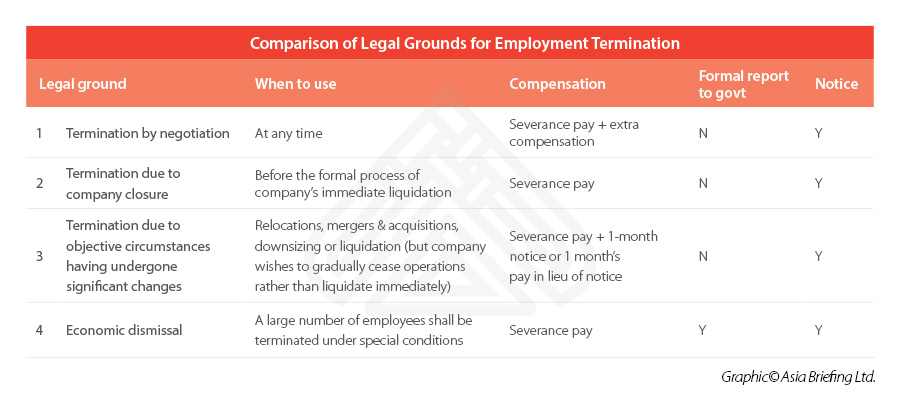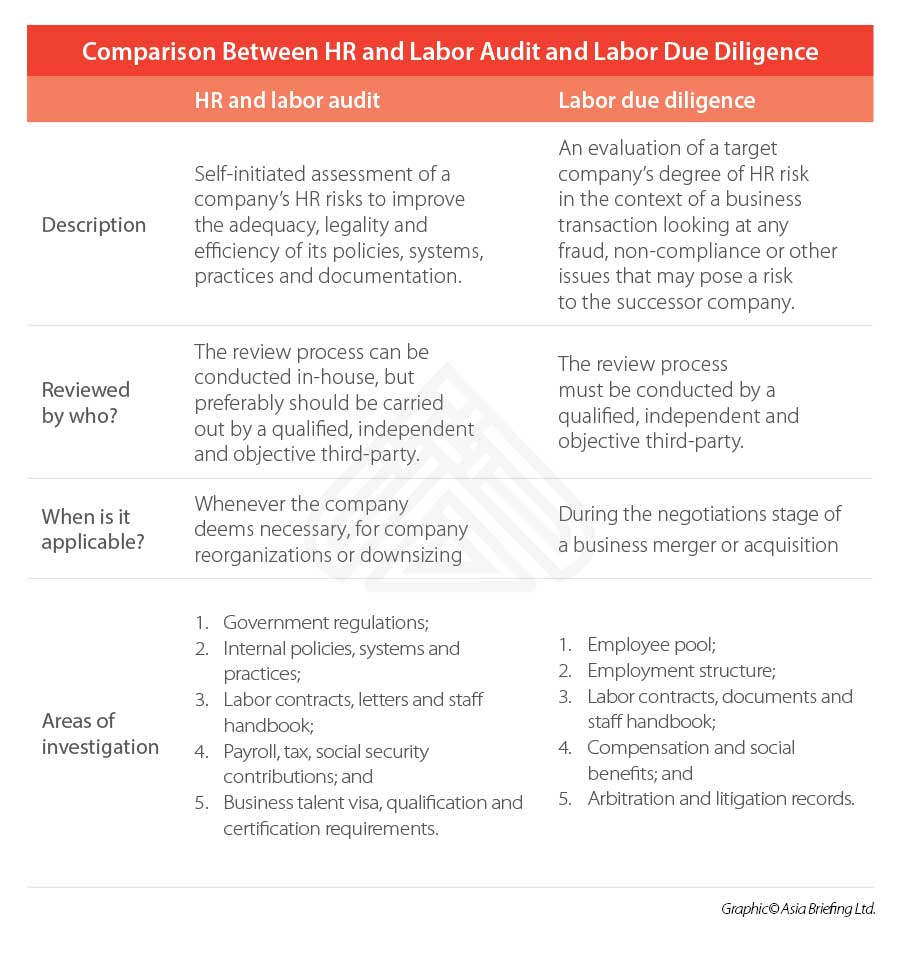China HR Considerations and Management Strategies During Company Restructuring Period
HR restructuring in China can be a tripwire for foreign companies given the country’s strict labor laws and regulatory standards. We spotlight top considerations.
The success of a company often hinges on its ability to recruit, retain, and realize the added value and potential of its employees.
Similarly, in the case of business restructuring – how you manage your human capital when your business is in flux, will ultimately determine whether your business remains dormant or thrives during the process.
In this article, we give you an overview of the tools and strategies available for HR managers during the company restructuring period.
HR restructuring strategies
When forming the restructuring plan, the HR manager may seek to terminate, adjust, or transfer an employee’s position depending on a company’s financial capacity, operational needs, and business strategy.
HR managers are often tasked with crafting a plan that will not only adhere to relevant labor laws, policies, and internal regulations, but will maximize talent and expand best practices to ensure the workforce is efficient during any given transitional period.
Generally speaking, in the restructuring process, the HR managers will be required to complete one or more of the following:
- Reviewing the current state of HR policies, practices, documentation, and systems;
- Selection of the appropriate methodology for employee restructuring;
- Outlining the plan for the restructuring process – factoring in expected costs, timeframe, and handling litigation and claim assessments; and
- Managing and supporting the workforce during the transitional period.
This will ensure a smooth winding-down process, or in other cases, the long-term sustainable development of the restructured enterprise.
Termination
Where a company restructuring involves downsizing, liquidation, merging, or being acquired by another entity – a company may choose to terminate one or more of its employees as part of the process.
The Labor Contract Law of the People’s Republic of China (“PRC Labor Contract Law”) provides the legal grounds in which to do so.
Termination by negotiation
The first legal ground is the most flexible option for employers. Termination by negotiation is a way to include employees in the discussion for more favorable terms and to limit the potential scope for labor disputes and unrest.
However, usually employers have to prepare to pay more compensation on top of the statutory severance pay in order to quickly end the staff termination process.
Termination due to company closure
Termination due to company closure is a catch-all provisions for terminating less than 20 employees and occurs before the formal process of a company’s liquidation.
Under this option, it is necessary for the company to prepare the shareholder resolution and/or board resolution to justify the staff termination.
Termination due to significant changes
Termination due to objective circumstances is usually chosen as a way to keep the company alive and buy some time to resolve ongoing tax and legal issues, or to allow time to sell the company’s fixed assets before formal liquidation takes place.
Under this selection, an employer must overcome the hurdle of demonstrating that the company has undergone a ‘significant change’ so much so that the labor contract is no longer able to be performed.
Economic dismissal
Finally, economic dismissal applies to dismissal of 20 or more employee or 10 percent or more of the employees at the company.
A worker who has entered into fixed-term labor contract for a longer period, entered into a non-fixed term labor contract with the employer, or whose family members are not employed or who need to support aged or under-aged family members, must be given priority to be retained in any retrenchment.
For both, termination due to significant company changes and economic dismissal, the employees who are deemed under the law to be ‘vulnerable workers’(employees with occupational illnesses/ injuries, female employees in pregnancy, maternity leave and nursing period, employees in the legal medical treatment period for non-occupational illness/ injury, and employees who have worked for the company for more than 15 years) cannot be dismissed.
Internal transfer: Adjustments to current agreement
Where the company decides to downsize their business either to reduce costs or to adapt to changes in the enterprises’ business model, the employer can consider adjusting an employee’s role and renegotiate their salary accordingly.
Equally, an employer may decide to transfer the employee to another office, location, or department in which their skills may be better utilized.
These options must be exercised with caution, to avoid possible labor litigation, which may put the employer at a disadvantage. For example, the employer should carry out assessment for the employee’s performance in different positions and retain sufficient evidence of the rationality of job transfers and salary adjustments.
Though Chinese law does not explicitly address the issue of position and salary adjustments, it does imply some situations where there are legitimate grounds to do so. For example, where: Article 40 of the PRC Labor Contract Law suggests that where an employer can transfer an employee’s position with the appropriate adjustments to a person’s salary and wages, it can do so for one of the following reasons:
- The employee is found incapable of performing the job duties;
- The employee suffers from an illness or non-work-related injury and is unable to undertake the original job duties following the completion of the stipulated medical treatment period; and
- The objective circumstances of the employer have undergone significant changes, and as a result, the original labor contract can no longer be performed.
Where an employee is relocated to a different department or office within the same company – no severance pay is needed.
However, the HR department should prepare a new confirmation letter or a supplementary agreement to clearly reflect the changes made, particularly in relation to the salary, role, and location. Where there are significant changes to the scope of the roles, issuing a new job description is highly advised.
Any changes to the labor contract should always be made in writing.
Besides this, the employer can also contemplate adjusting the staff salary upon equal negotiation with labor unions and employee representatives. As part of these negotiations, the employer and employee can negotiate on terms such as: leave, work hours, compensation structure, remote working, and timing of salary payments.
External transfers during mergers & acquisitions
Where a company is merged or acquired by another company – they will be required to transfer part or all their equity and assets. In such a situation, there may be some movement of employees from one company to another.
For asset transfers, the selling company can negotiate with their employee(s) to be transferred to the buying company. It is important to note that under PRC law, such transfer of employees is not automatic and will require employee consent.
If the employee is not willing to go, the contract will be terminated, and severance paid out. If the employee is willing to accept the transfer, the selling company can terminate the contract with the employee and pay out the severance owed. The employee will then start afresh with the buyer company, resetting the employment duration back to day one.
Alternatively, the buying company may, upon negotiation, agree to accept the employee transfer and inherit the prior accumulated years of service. This will usually be discussed during the business negotiations. As part of these negotiations, the buyer company should ensure that they perform a thorough due diligence on the target company. This should include a thorough background check on the key personnel the buyer company is planning to inherit from the target company – conducting a background, qualification, and visa check in relation to the employees’ new positions and contract terms.
In equity transfer, however, the employees of the acquired company will be unaffected by the deal in most situations. In such a case, especially where the acquiring company adopts the same company name, the contract is not required to be changed.
Assessment of your HR department
An initial review of a company’s HR department is a good way to assess the current state of its HR practices and systems.
This is a particularly prudent strategy as HR laws and regulations in China are a major tripwire for businesses operating across multiple offices and locations.
The HR and labor audit and labor due diligence are two methods of identifying risks within a company’s HR department. However, where they differ are in terms of application, scope and outcome (see table).
When conducting such a review, it is important to consider the following factors for compliance:
- Employment mode – whether an employee is full-time, part-time, labor dispatched, outsourced, or expat employee;
- Location – different local laws and regulations will apply accordingly;
- Remuneration and benefits – salary, bonus, commission, or allowances;
- Taxation, social insurance, housing fund and commercial insurance – five statutory insurance and non-statutory insurance (for example, employer’s liability insurance, supplementary medical insurance);
- Contract terms – job description, working hours, reporting line, severance pay, notice period, confidentiality and non-complete clauses; and
- Exit management processes – termination procedure, documentation, and handover.
Due to the complex and idiosyncratic regulations that exist in different cities in China, HR and labor audits often play a heightened role when compared to other Asian markets.
For example, employers operating multiple offices and locations in China will need to account for variations in the local minimum wage, contribution base ceiling and floor, the contribution rates, the social insurance, and housing fund registration, as well as other compliance requirements, from one to city to another.
In addition, reviewing the effectiveness and efficiency of its systems and employees will form the basis of a self-assessment into the competitiveness of the company within the market. This means a thorough inventory of the employee’s skills, experience, background, and performance in line with the department needs, any relevant structural changes and net employee turnovers.
Such inventory will equip HR managers in making key decisions on how to select and retain key employees, how to use outsourcing and digitalization methods to complement existing employee capacity, and how to develop effective employee compensation and benefits program.
An effective HR restructuring strategy should always be centered around a clear business objective and will always consider the functions and operations within the company to determine the work and roles that are needed.
The information gleaned during the HR and labor audit or labor due diligence process will be able to inform and guide HR managers as to how to best handle the HR restructuring process.
About Us
China Briefing is written and produced by Dezan Shira & Associates. The practice assists foreign investors into China and has done so since 1992 through offices in Beijing, Tianjin, Dalian, Qingdao, Shanghai, Hangzhou, Ningbo, Suzhou, Guangzhou, Dongguan, Zhongshan, Shenzhen, and Hong Kong. Please contact the firm for assistance in China at china@dezshira.com.
Dezan Shira & Associates has offices in Vietnam, Indonesia, Singapore, United States, Germany, Italy, India, and Russia, in addition to our trade research facilities along the Belt & Road Initiative. We also have partner firms assisting foreign investors in The Philippines, Malaysia, Thailand, Bangladesh.
- Previous Article An Introduction to Doing Business in Hong Kong 2021 – New Publication from Dezan Shira & Associates
- Next Article Pre-Establishment Considerations for Setting Up a WFOE in China












